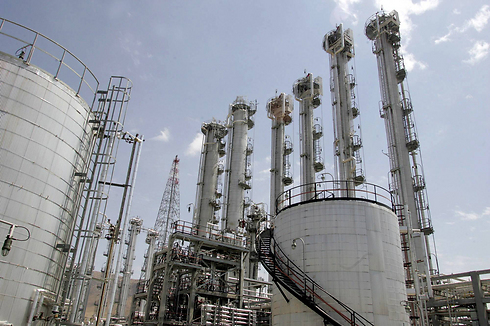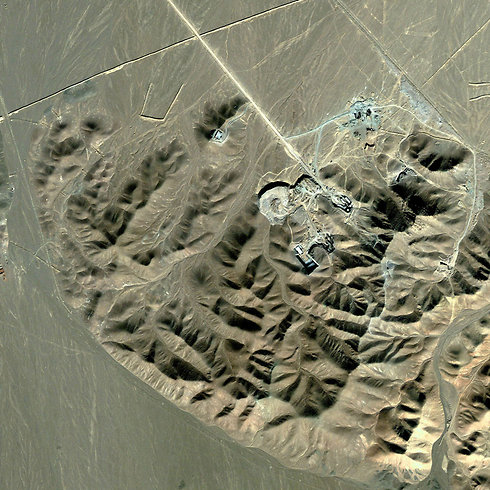
If there will be a deal with Iran over its nuclear program, it will be signed in the winter, just after US congressional elections and just before the new Congress is sworn in in January.
The reason derives from the fact that President Obama doesn't want his policy on Iran to be the focal point of elections and he will try to push through a deal before the swearing in of Congress when the Democrats are likely to lose their majority on Capitol Hill.
This is all according to Robert Einhorn, one of Obama's former senior nuclear specialists, who spoke to Ynet in an exclusive interview.
Related Stories
- Ashton, Zarif to meet in Iran to discuss nuclear talks
-
Iranian hackers use fake Facebook accounts to spy on US, Israel
Israeli strike on Iran would be a 'grave mistake' while talks continue
"It will be difficult for the powers to reach an agreement with Iran by the deadline of July 20," said Einhorn. "The last round of talks didn't amount to expectations. There was hope that some main issues would be solved, like the issue of the reactor in Arak (a facility that could give Iran the ability to build a nuclear weapon using plutonium instead of uraniam), but that didn't happen."
"Both sides will examine their expectations and they'll reach the conclusion that the possibility of reaching a deal is slim. My assessment is that when faced with the alternative of ending the talks, the two sides will agree to extend them," said Einhorn.
In order to reach a deal, he explained that, "The Iranian's will want more relief from sanctions. The government will offer to continue without sanction relief. The Iranians will want relief from frozen oil profits and in this case the government will demand further drawbacks in the nuclear program."
The senior American expert explained that it's mostly the Iranians who should be feeling pressured by the current situation. "At the start of the intermediate deal there were Israelis who claimed that the six months (a period of time initially agreed to for talks) were in Iran's interest, suggesting that there would be enthusiasm in the business community for economic activity with Iran, and the sanctions would be eroded."
"This assessment proved to be wrong. What actually happened was that the companies in the world were very cautious and didn't sign new contracts with Iran. The Iranians themselves were disappointed the benefits of those months," said Einhorn.
"They expected a lot more. The reality is that the current terms of the talks are in the interest of the US and her partners. Iran is eager for the removal of sanctions."
Congressional elections have an effect on the peace talks, said Einhorn. "On one hand, an agreement before elections isn't in the interests of the White House. He (Obama) doesn't want Iran to be an issue during the elections. On the other hand, there is concern that the Republicans will win in senatorial elections (the Senate currently has a Democratic majority)."
The main criticism about the interim agreement was that it didn't significantly stymie Iran's breakout ability towards an atom bomb. US Secretary of State John Kerry estimated that in the current conditions, Iran could achieve nuclear status in two month's time.
Einhorn, who was among the administration's senior decision makers on the issue, said he did not want to merely freeze the current situation. "It's unacceptable. It's important to distance Iran from such breakout ability, and for that Iran must reduce the number of centrifuges and the amount of enriched uranium that they are allowed to keep. From America's point of view, the status quo is possible for another six months, but not forever."
But there are those who claim that President Obama is trying to stall until the end of his term without having to make the decision whether to strike or not.
Einhorn: "Obama wants results within a year from the beginning of talks. He wants results and he's under a lot of pressure from Congress and Israel. The reality is that if it proves impossible to reach a good agreement within a year, then it won't be possible to achieve one with more time."
Has the military option been taken off the table?
"Israel needs to prepare for every eventuality. Sometimes it's up you to prepare for the worst and that's what Israel is doing. The US isn't in close proximity to Iran like Israel and we aren't the target of threats of the type that Iran makes against Israel, but preventing the Iranians from acquiring nuclear weapons is a top priority for the US."
According to Einhorn, the US will be sure to take military action in the case that Iran is caught in violation of agreements while moving forward with their nuclear program.
"There is a possibility in that situation that force will be used. In the case of agreement violations I have no doubt that the President will exercise his obligation to prevent the Iranians from acquiring nuclear weapons."
Einhorn said that if the talks will be cancelled and the Ayatollahs don't progress toward a nuclear weapon, it will be more difficult to act. The Iranian's, he said, are very calculating. When they didn't want to cross red lines in accumulating enriched uranium, they progressed in a different way.
"Missile programs are advancing," he stressed, "but not fast." According to Einhorn, it's much easier to know what's happening with sources of uranium and plutonium. It's harder to guess where the Iranians stand in progress towards a bomb itself. That's a subject that has come up in meetings with the Iranians and representatives from the International Atomic Energy Agency, but until now still hasn't been addressed in talks between the world powers and Iran.

















